Roberts A.D. The Cambridge History of Africa, Volume 7: from 1905 to 1940
Подождите немного. Документ загружается.

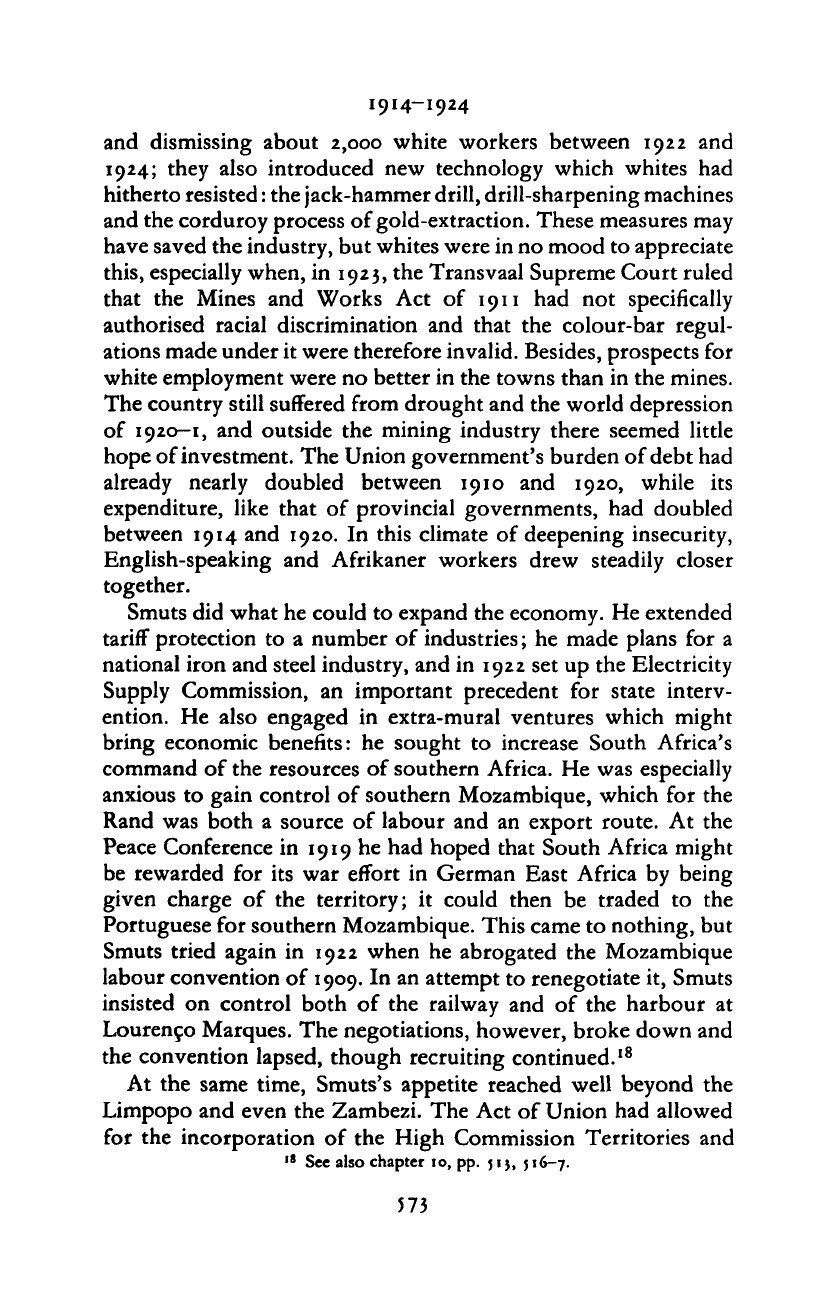
1914-1924
and dismissing about 2,000 white workers between 1922 and
1924;
they also introduced new technology which whites had
hitherto resisted: the jack-hammer
drill,
drill-sharpening machines
and the corduroy process of gold-extraction. These measures may
have saved the industry, but whites were in no mood to appreciate
this,
especially when, in
1923,
the Transvaal Supreme Court ruled
that the Mines and Works Act of 1911 had not specifically
authorised racial discrimination and that the colour-bar regul-
ations made under it were therefore invalid. Besides, prospects for
white employment were no better in the towns than in the mines.
The country still suffered from drought and the world depression
of
1920—1,
and outside the mining industry there seemed little
hope of investment. The Union government's burden of debt had
already nearly doubled between 1910 and 1920, while its
expenditure, like that of provincial governments, had doubled
between 1914 and 1920. In this climate of deepening insecurity,
English-speaking and Afrikaner workers drew steadily closer
together.
Smuts did what he could to expand the economy. He extended
tariff protection to a number of industries; he made plans for a
national iron and steel industry, and in 1922 set up the Electricity
Supply Commission, an important precedent for state interv-
ention. He also engaged in extra-mural ventures which might
bring economic benefits: he sought to increase South Africa's
command of the resources of southern Africa. He was especially
anxious to gain control of southern Mozambique, which for the
Rand was both a source of labour and an export route. At the
Peace Conference in 1919 he had hoped that South Africa might
be rewarded for its war effort in German East Africa by being
given charge of the territory; it could then be traded to the
Portuguese for southern Mozambique. This came to nothing, but
Smuts tried again in 1922 when he abrogated the Mozambique
labour convention of
1909.
In an attempt to renegotiate it, Smuts
insisted on control both of the railway and of the harbour at
Lourenco Marques. The negotiations, however, broke down and
the convention lapsed, though recruiting continued.
18
At the same time, Smuts's appetite reached well beyond the
Limpopo and even the Zambezi. The Act of Union had allowed
for the incorporation of the High Commission Territories and
18
See also chapter 10, pp. J13, 516-7.
573
Cambridge Histories Online © Cambridge University Press, 2008
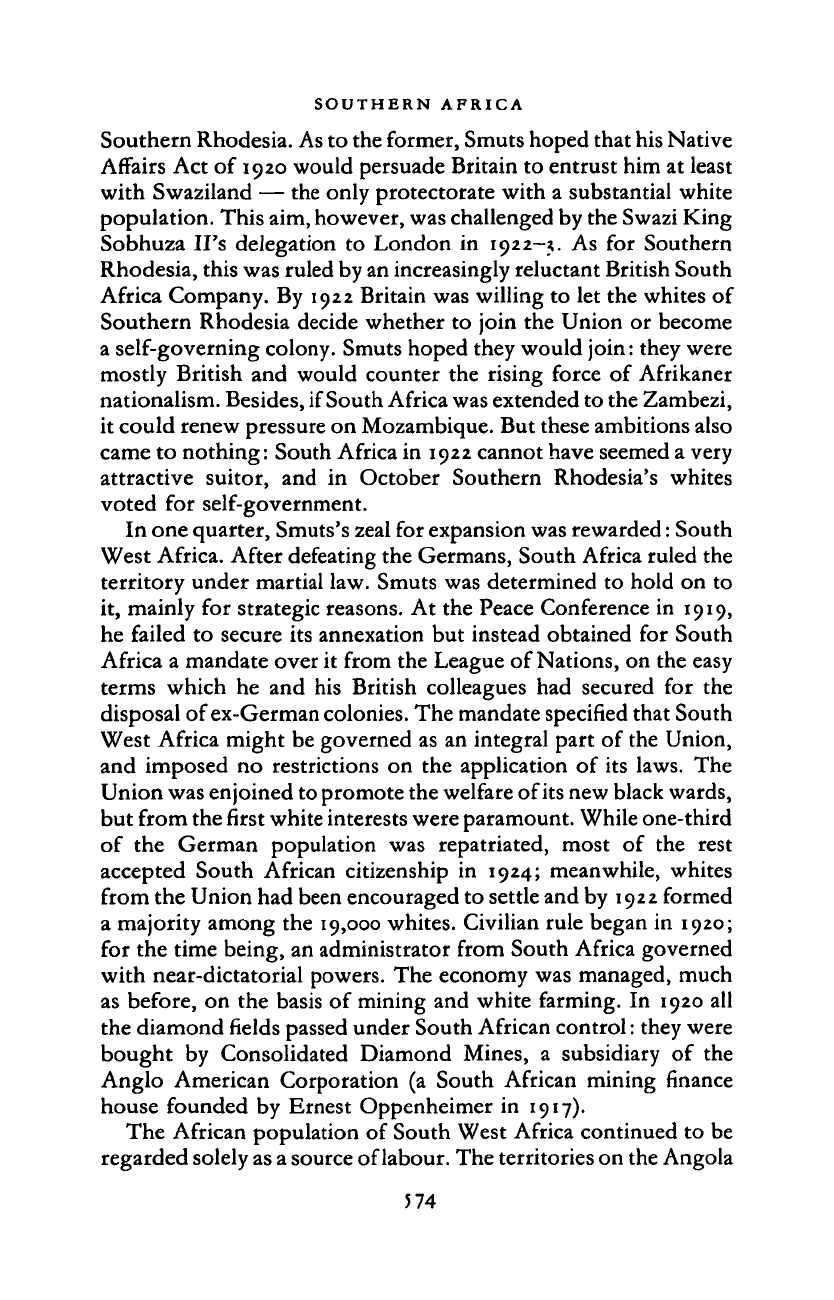
SOUTHERN AFRICA
Southern Rhodesia. As to the former, Smuts hoped that his Native
Affairs Act of 1920 would persuade Britain to entrust him at least
with Swaziland — the only protectorate with a substantial white
population. This aim, however, was challenged by the Swazi King
Sobhuza II's delegation to London in 1922-3. As for Southern
Rhodesia, this was ruled by an increasingly reluctant British South
Africa Company. By 1922 Britain was willing to let the whites of
Southern Rhodesia decide whether to join the Union or become
a self-governing colony. Smuts hoped they would join: they were
mostly British and would counter the rising force of Afrikaner
nationalism. Besides, if South Africa was extended to the Zambezi,
it could renew pressure on Mozambique. But these ambitions also
came to nothing: South Africa in 1922 cannot have seemed a very
attractive suitor, and
in
October Southern Rhodesia's whites
voted for self-government.
In one quarter, Smuts's zeal for expansion was rewarded: South
West Africa. After defeating the Germans, South Africa ruled the
territory under martial law. Smuts was determined to hold on to
it, mainly for strategic reasons. At the Peace Conference in 1919,
he failed to secure its annexation but instead obtained for South
Africa a mandate over it from the League of
Nations,
on the easy
terms which he and his British colleagues had secured
for
the
disposal of ex-German
colonies.
The mandate specified that South
West Africa might be governed as an integral part of the Union,
and imposed no restrictions on the application
of
its laws. The
Union was enjoined
to
promote the welfare of its new black wards,
but from the first white interests were paramount. While one-third
of the German population was repatriated, most
of
the rest
accepted South African citizenship
in
1924; meanwhile, whites
from the Union had been encouraged to settle and by 1922 formed
a majority among the 19,000 whites. Civilian rule began in 1920;
for the time being, an administrator from South Africa governed
with near-dictatorial powers. The economy was managed, much
as before, on the basis of mining and white farming. In 1920 all
the diamond fields passed under South African control: they were
bought
by
Consolidated Diamond Mines,
a
subsidiary
of
the
Anglo American Corporation
(a
South African mining finance
house founded by Ernest Oppenheimer in 1917).
The African population of South West Africa continued to be
regarded solely as
a
source of labour. The territories on the Angola
5
74
Cambridge Histories Online © Cambridge University Press, 2008
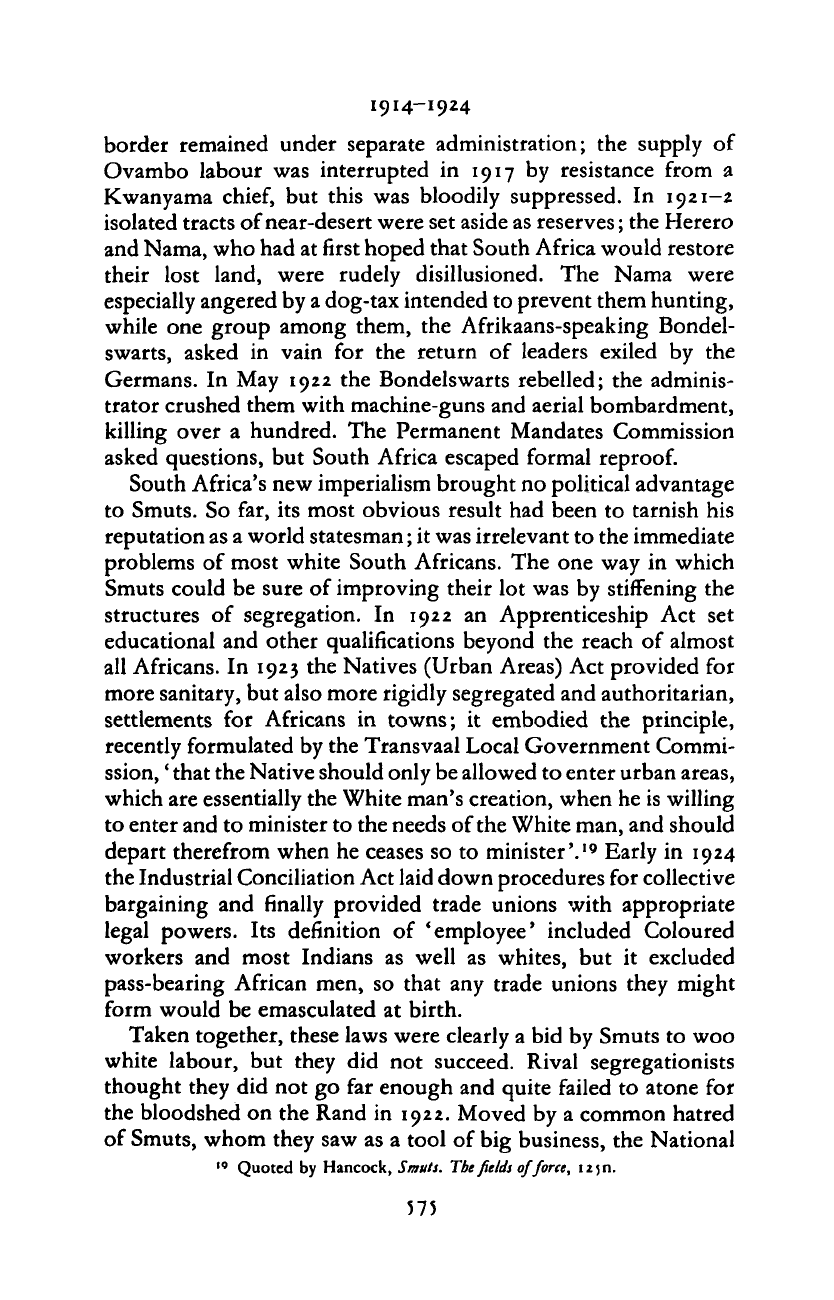
border remained under separate administration; the supply of
Ovambo labour was interrupted in 1917 by resistance from a
Kwanyama
chief,
but this was bloodily suppressed. In 1921-2
isolated tracts of near-desert were set aside as reserves; the Herero
and Nama, who had at first hoped that South Africa would restore
their lost land, were rudely disillusioned. The Nama were
especially angered by
a
dog-tax intended to prevent them hunting,
while one group among them, the Afrikaans-speaking Bondel-
swarts, asked in vain for the return of leaders exiled by the
Germans. In May 1922 the Bondelswarts rebelled; the adminis-
trator crushed them with machine-guns and aerial bombardment,
killing over a hundred. The Permanent Mandates Commission
asked questions, but South Africa escaped formal
reproof.
South Africa's new imperialism brought no political advantage
to Smuts. So far, its most obvious result had been to tarnish his
reputation as a world statesman; it was irrelevant to the immediate
problems of most white South Africans. The one way in which
Smuts could be sure of improving their lot was by stiffening the
structures of segregation. In 1922 an Apprenticeship Act set
educational and other qualifications beyond the reach of almost
all Africans. In 1923 the Natives (Urban Areas) Act provided for
more sanitary, but also more rigidly segregated and authoritarian,
settlements for Africans in towns; it embodied the principle,
recently formulated by the Transvaal Local Government Commi-
ssion,
'
that the Native should only be allowed to enter urban areas,
which are essentially the White man's creation, when he is willing
to enter and to minister to the needs of the White man, and should
depart therefrom when he ceases so to minister'.
19
Early in 1924
the Industrial Conciliation Act laid down procedures for collective
bargaining and finally provided trade unions with appropriate
legal powers. Its definition of 'employee' included Coloured
workers and most Indians as well as whites, but it excluded
pass-bearing African men, so that any trade unions they might
form would be emasculated at birth.
Taken together, these laws were clearly a bid by Smuts to woo
white labour, but they did not succeed. Rival segregationists
thought they did not go far enough and quite failed to atone for
the bloodshed on the Rand in 1922. Moved by a common hatred
of Smuts, whom they saw as a tool of big business, the National
" Quoted by Hancock, Smuts. Tbe fields of force, 12511.
575
Cambridge Histories Online © Cambridge University Press, 2008
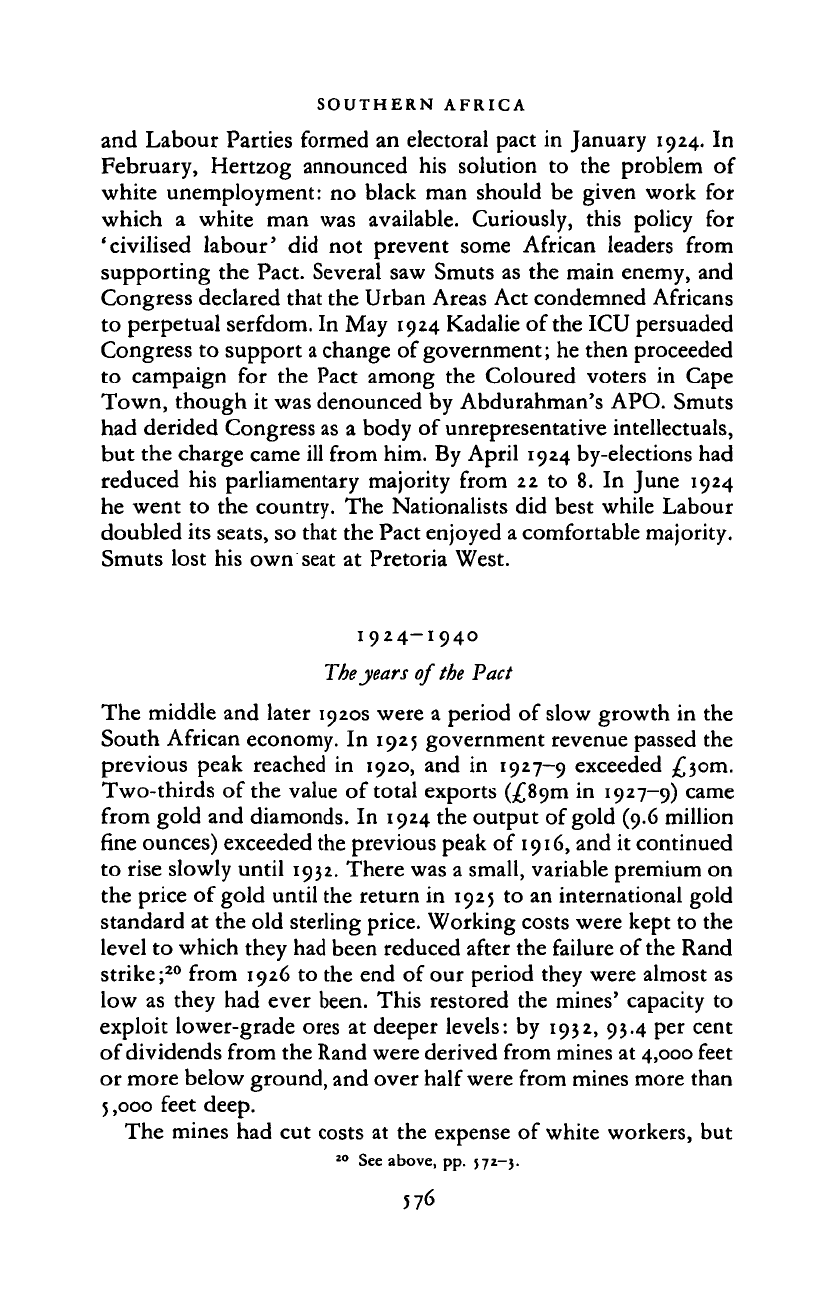
SOUTHERN AFRICA
and Labour Parties formed an electoral pact in January 1924. In
February, Hertzog announced his solution to the problem of
white unemployment: no black man should be given work for
which a white man was available. Curiously, this policy for
'civilised labour' did not prevent some African leaders from
supporting the Pact. Several saw Smuts as the main enemy, and
Congress declared that the Urban Areas Act condemned Africans
to perpetual serfdom. In May 1924 Kadalie of the ICU persuaded
Congress to support
a
change of government; he then proceeded
to campaign for the Pact among the Coloured voters in Cape
Town, though it was denounced by Abdurahman's APO. Smuts
had derided Congress as a body of unrepresentative intellectuals,
but the charge came ill from him. By April 1924 by-elections had
reduced his parliamentary majority from 22 to 8. In June 1924
he went to the country. The Nationalists did best while Labour
doubled its seats, so that the Pact enjoyed a comfortable majority.
Smuts lost his own seat at Pretoria West.
1924—1940
The years of
the
Pact
The middle and later 1920s were a period of slow growth in the
South African economy. In 1925 government revenue passed the
previous peak reached in 1920, and in 1927—9 exceeded £3om.
Two-thirds of the value of total exports (£89111 in 1927-9) came
from gold and diamonds. In 1924 the output of gold (9.6 million
fine ounces) exceeded the previous peak of 1916, and it continued
to rise slowly until 1932. There was a small, variable premium on
the price of gold until the return in 1925 to an international gold
standard at the old sterling price. Working costs were kept to the
level to which they had been reduced after the failure of
the
Rand
strike;
20
from 1926 to the end of our period they were almost as
low as they had ever been. This restored the mines' capacity to
exploit lower-grade ores at deeper levels: by 1932, 93.4 per cent
of dividends from the Rand were derived from mines at 4,000 feet
or more below ground, and over half were from mines more than
5,000
feet deep.
The mines had cut costs at the expense of white workers, but
20
See above, pp. 571-3.
576
Cambridge Histories Online © Cambridge University Press, 2008
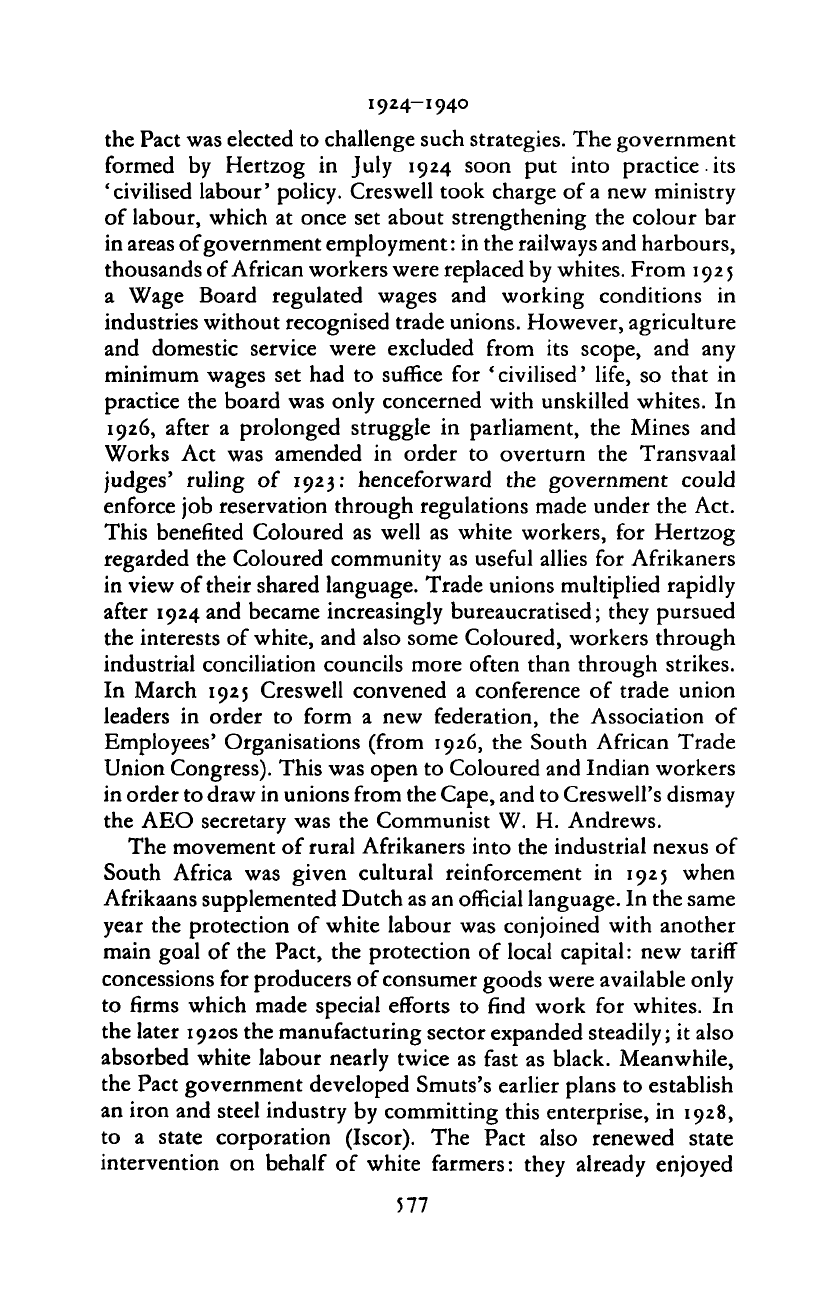
1924—194°
the Pact was elected to challenge such strategies. The government
formed by Hertzog in July 1924 soon put into practice its
'civilised labour' policy. Creswell took charge of a new ministry
of labour, which at once set about strengthening the colour bar
in areas of government employment: in the railways and harbours,
thousands of African workers were replaced by whites. From 1925
a Wage Board regulated wages and working conditions in
industries without recognised trade unions. However, agriculture
and domestic service were excluded from its scope, and any
minimum wages set had to suffice for 'civilised' life, so that in
practice the board was only concerned with unskilled whites. In
1926,
after a prolonged struggle in parliament, the Mines and
Works Act was amended in order to overturn the Transvaal
judges' ruling of 1923: henceforward the government could
enforce job reservation through regulations made under the Act.
This benefited Coloured as well as white workers, for Hertzog
regarded the Coloured community as useful allies for Afrikaners
in view of their shared language. Trade unions multiplied rapidly
after 1924 and became increasingly bureaucratised; they pursued
the interests of white, and also some Coloured, workers through
industrial conciliation councils more often than through strikes.
In March 1925 Creswell convened a conference of trade union
leaders in order to form a new federation, the Association of
Employees' Organisations (from 1926, the South African Trade
Union Congress). This was open to Coloured and Indian workers
in order to draw in unions from the Cape, and to CreswelPs dismay
the AEO secretary was the Communist W. H. Andrews.
The movement of rural Afrikaners into the industrial nexus of
South Africa was given cultural reinforcement in 1925 when
Afrikaans supplemented Dutch as an official language. In the same
year the protection of white labour was conjoined with another
main goal of the Pact, the protection of local capital: new tariff
concessions for producers of consumer goods were available only
to firms which made special efforts to find work for whites. In
the later 1920s the manufacturing sector expanded steadily; it also
absorbed white labour nearly twice as fast as black. Meanwhile,
the Pact government developed Smuts's earlier plans to establish
an iron and steel industry by committing this enterprise, in 1928,
to a state corporation (Iscor). The Pact also renewed state
intervention on behalf of white farmers: they already enjoyed
577
Cambridge Histories Online © Cambridge University Press, 2008
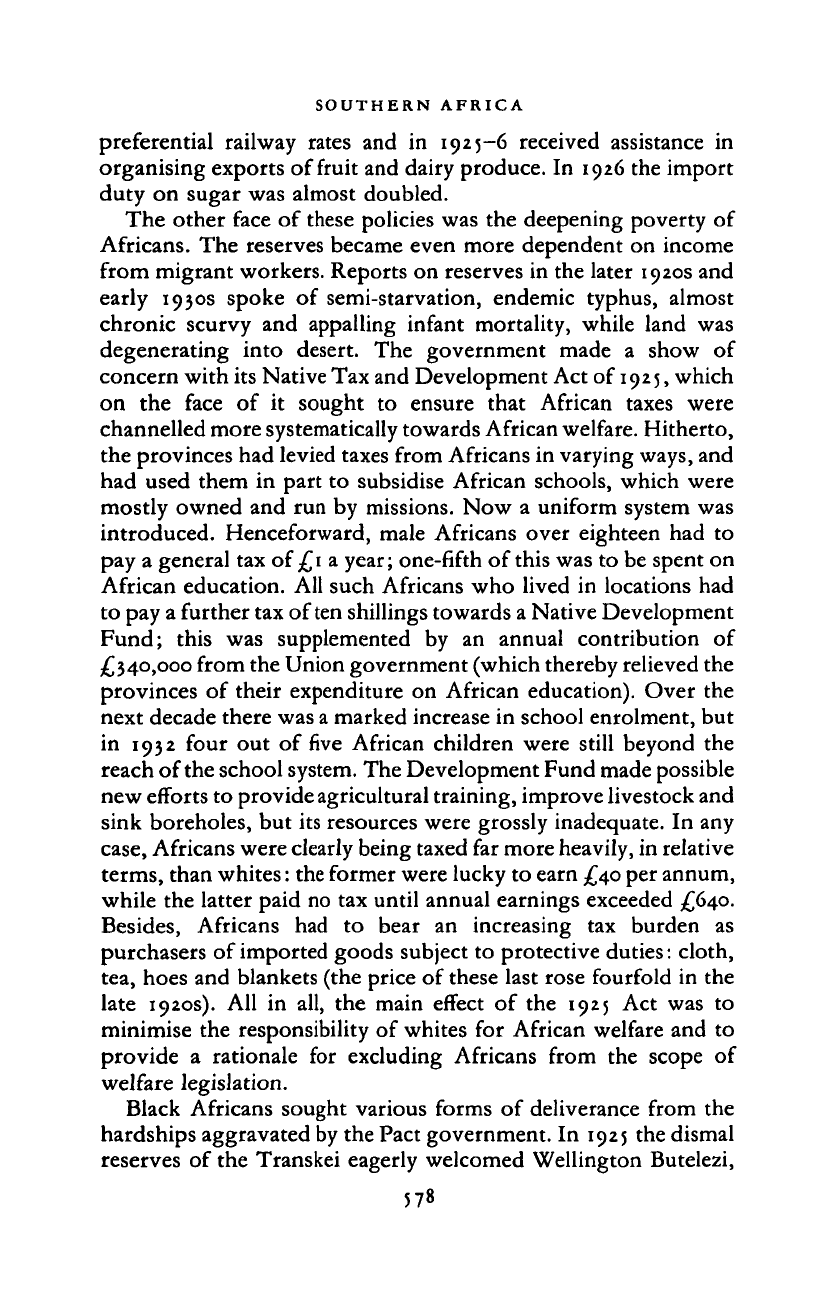
SOUTHERN AFRICA
preferential railway rates and
in
1925-6 received assistance
in
organising exports of fruit and dairy produce. In 1926 the import
duty on sugar was almost doubled.
The other face of these policies was the deepening poverty of
Africans. The reserves became even more dependent on income
from migrant workers. Reports on reserves in the later 1920s and
early 1930s spoke
of
semi-starvation, endemic typhus, almost
chronic scurvy and appalling infant mortality, while land was
degenerating into desert. The government made
a
show
of
concern with its Native Tax and Development Act of
1925,
which
on
the
face
of it
sought
to
ensure that African taxes were
channelled more systematically towards African welfare. Hitherto,
the provinces had levied taxes from Africans in varying ways, and
had used them in part to subsidise African schools, which were
mostly owned and run by missions. Now
a
uniform system was
introduced. Henceforward, male Africans over eighteen had
to
pay a general tax of
£1
a year; one-fifth of this was to be spent on
African education. All such Africans who lived in locations had
to pay a further tax often shillings towards a Native Development
Fund; this was supplemented
by an
annual contribution
of
£340,000 from the Union government (which thereby relieved the
provinces
of
their expenditure on African education). Over the
next decade there was
a
marked increase in school enrolment, but
in 1932 four out
of
five African children were still beyond the
reach of the school system. The Development Fund made possible
new efforts to provide agricultural training, improve livestock and
sink boreholes, but its resources were grossly inadequate. In any
case,
Africans were clearly being taxed far more heavily, in relative
terms,
than whites: the former were lucky to earn £40 per annum,
while the latter paid no tax until annual earnings exceeded £640.
Besides, Africans
had to
bear
an
increasing
tax
burden
as
purchasers of imported goods subject to protective duties: cloth,
tea, hoes and blankets (the price of these last rose fourfold in the
late 1920s). All
in
all, the main effect
of
the 1925 Act was
to
minimise the responsibility of whites for African welfare and
to
provide
a
rationale
for
excluding Africans from the scope
of
welfare legislation.
Black Africans sought various forms of deliverance from the
hardships aggravated by the Pact government. In 1925 the dismal
reserves of the Transkei eagerly welcomed Wellington Butelezi,
578
Cambridge Histories Online © Cambridge University Press, 2008
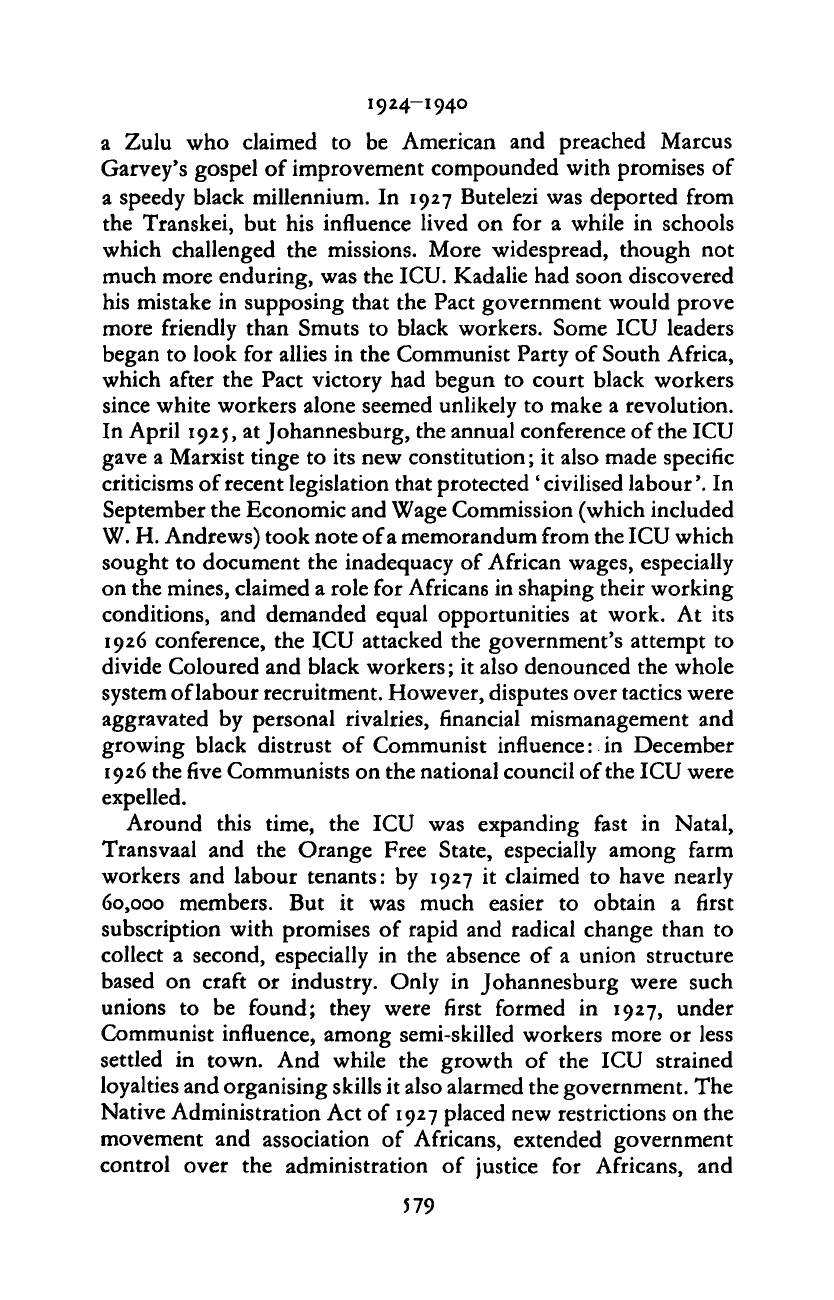
a Zulu who claimed to be American and preached Marcus
Garvey's gospel of improvement compounded with promises of
a speedy black millennium. In 1927 Butelezi was deported from
the Transkei, but his influence lived on for a while in schools
which challenged the missions. More widespread, though not
much more enduring, was the ICU. Kadalie had soon discovered
his mistake in supposing that the Pact government would prove
more friendly than Smuts to black workers. Some ICU leaders
began to look for allies in the Communist Party of South Africa,
which after the Pact victory had begun to court black workers
since white workers alone seemed unlikely to make a revolution.
In April
1925,
at Johannesburg, the annual conference of the ICU
gave a Marxist tinge to its new constitution; it also made specific
criticisms of recent legislation that protected 'civilised labour'. In
September the Economic and Wage Commission (which included
W. H. Andrews) took note of
a
memorandum from the ICU which
sought to document the inadequacy of African wages, especially
on the mines, claimed a role for Africans in shaping their working
conditions, and demanded equal opportunities at work. At its
1926 conference, the ICU attacked the government's attempt to
divide Coloured and black workers; it also denounced the whole
system of labour recruitment. However, disputes over tactics were
aggravated by personal rivalries, financial mismanagement and
growing black distrust of Communist influence: in December
1926 the five Communists on the national council of the ICU were
expelled.
Around this time, the ICU was expanding fast in Natal,
Transvaal and the Orange Free State, especially among farm
workers and labour tenants: by 1927 it claimed to have nearly
60,000 members. But it was much easier to obtain a first
subscription with promises of rapid and radical change than to
collect a second, especially in the absence of a union structure
based on craft or industry. Only in Johannesburg were such
unions to be found; they were first formed in 1927, under
Communist influence, among semi-skilled workers more or less
settled in town. And while the growth of the ICU strained
loyalties and organising skills it also alarmed the government. The
Native Administration Act of 1927 placed new restrictions on the
movement and association of Africans, extended government
control over the administration of justice for Africans, and
579
Cambridge Histories Online © Cambridge University Press, 2008
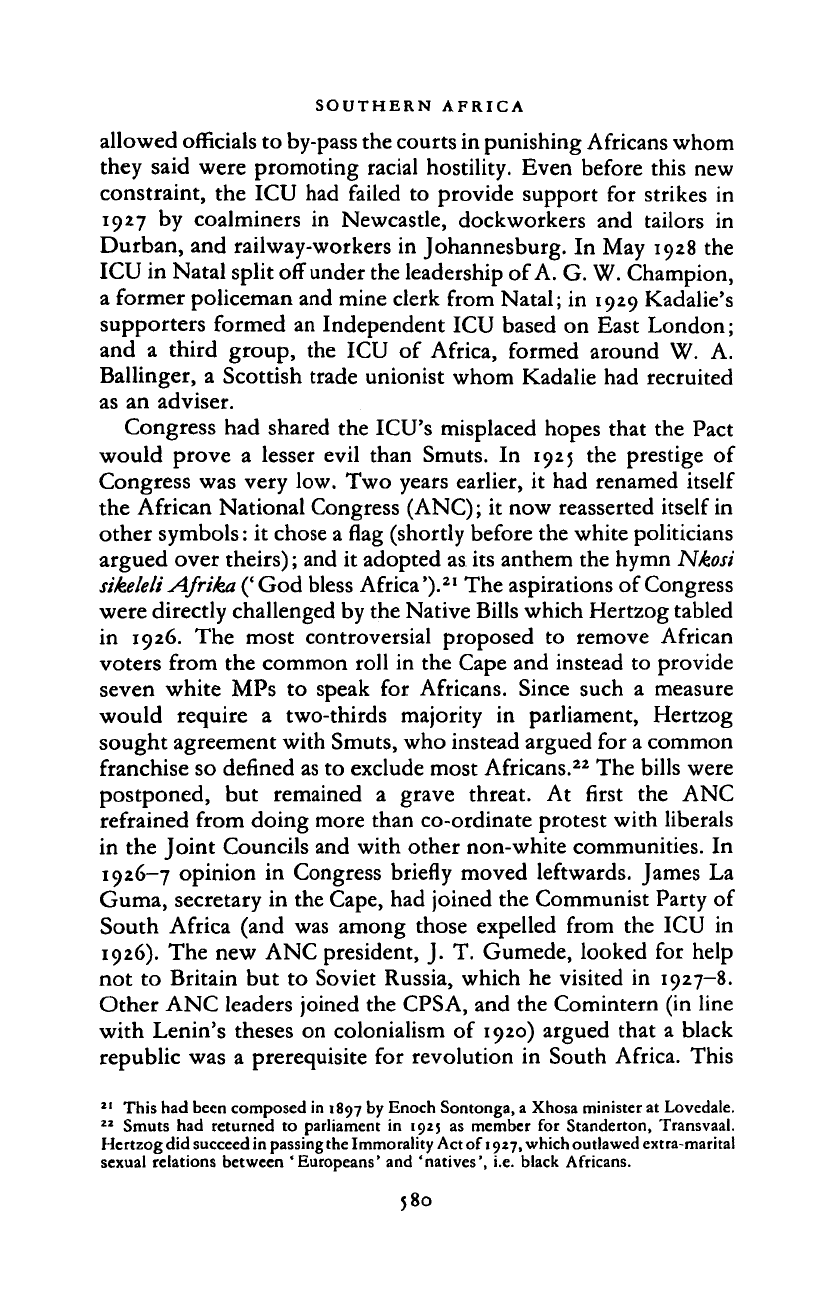
SOUTHERN AFRICA
allowed officials to by-pass the courts in punishing Africans whom
they said were promoting racial hostility. Even before this new
constraint, the ICU had failed to provide support for strikes in
1927 by coalminers in Newcastle, dockworkers and tailors in
Durban, and railway-workers in Johannesburg. In May 1928 the
ICU in Natal split off under the leadership of A. G. W. Champion,
a former policeman and mine clerk from Natal; in 1929 Kadalie's
supporters formed an Independent ICU based on East London;
and a third group, the ICU of Africa, formed around W. A.
Ballinger, a Scottish trade unionist whom Kadalie had recruited
as an adviser.
Congress had shared the ICU's misplaced hopes that the Pact
would prove a lesser evil than Smuts. In 1925 the prestige of
Congress was very low. Two years earlier, it had renamed itself
the African National Congress (ANC); it now reasserted itself in
other symbols: it chose a flag (shortly before the white politicians
argued over theirs); and it adopted as its anthem the hymn Nkosi
sikeleli
Afrika ('God bless Africa').
21
The aspirations of Congress
were directly challenged by the Native Bills which Hertzog tabled
in 1926. The most controversial proposed to remove African
voters from the common roll in the Cape and instead to provide
seven white MPs to speak for Africans. Since such a measure
would require a two-thirds majority in parliament, Hertzog
sought agreement with Smuts, who instead argued for a common
franchise so defined as to exclude most Africans.
22
The bills were
postponed, but remained a grave threat. At first the ANC
refrained from doing more than co-ordinate protest with liberals
in the Joint Councils and with other non-white communities. In
1926-7 opinion in Congress briefly moved leftwards. James La
Guma, secretary in the Cape, had joined the Communist Party of
South Africa (and was among those expelled from the ICU in
1926).
The new ANC president, J. T. Gumede, looked for help
not to Britain but to Soviet Russia, which he visited in 1927-8.
Other ANC leaders joined the CPSA, and the Comintern (in line
with Lenin's theses on colonialism of 1920) argued that a black
republic was a prerequisite for revolution in South Africa. This
11
This had been composed in 1897 by Enoch Sontonga,
a
Xhosa minister at Lovedale.
22
Smuts had returned to parliament in 192; as member for Standerton, Transvaal.
Hertzog
did
succeed in passing
the
Immorality Act of
1927,
which outlawed extra-marital
sexual relations between 'Europeans' and 'natives', i.e. black Africans.
580
Cambridge Histories Online © Cambridge University Press, 2008
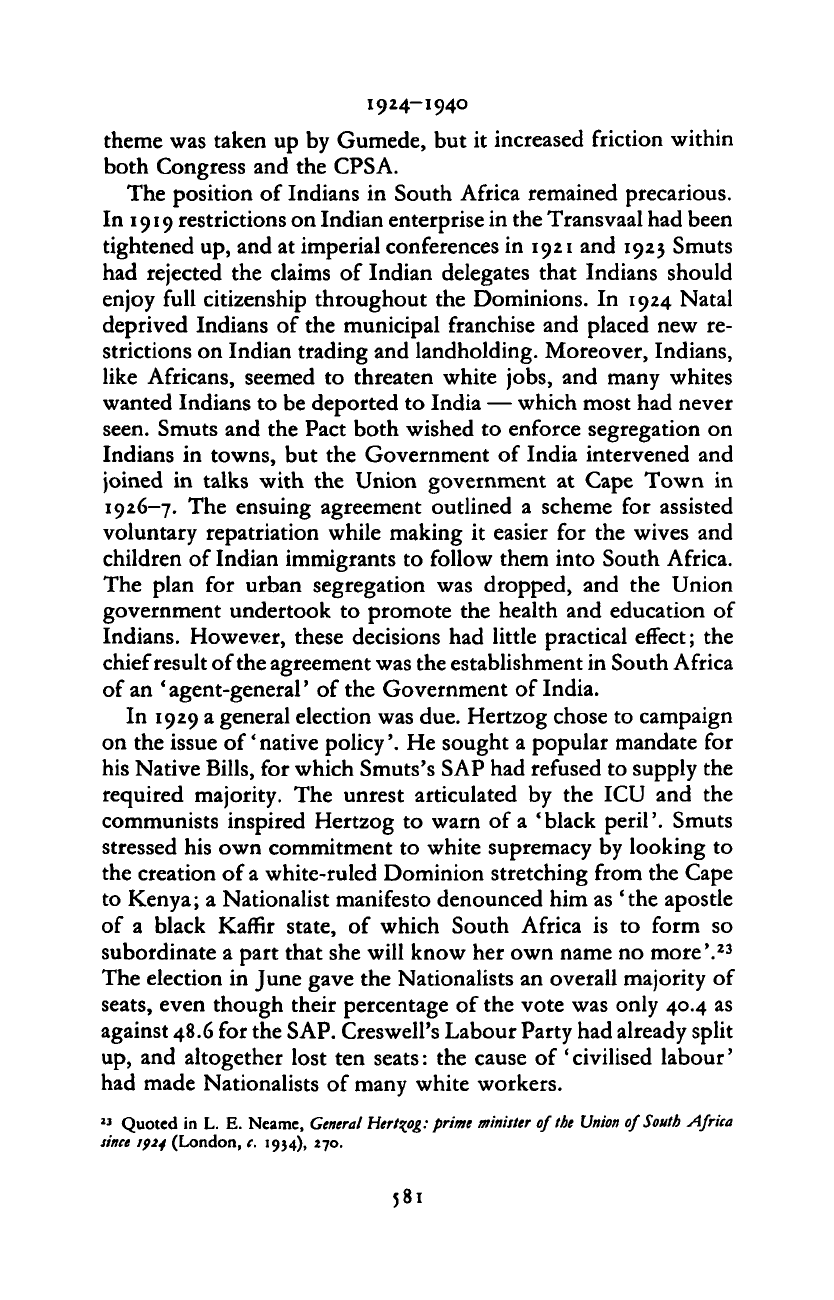
1924-194°
theme was taken up by Gumede, but it increased friction within
both Congress and the CPSA.
The position of Indians in South Africa remained precarious.
In 1919 restrictions on Indian enterprise in the Transvaal had been
tightened up, and at imperial conferences in 1921 and 1923 Smuts
had rejected the claims of Indian delegates that Indians should
enjoy full citizenship throughout the Dominions. In 1924 Natal
deprived Indians of the municipal franchise and placed new re-
strictions on Indian trading and landholding. Moreover, Indians,
like Africans, seemed to threaten white jobs, and many whites
wanted Indians to be deported to India — which most had never
seen. Smuts and the Pact both wished to enforce segregation on
Indians in towns, but the Government of India intervened and
joined in talks with the Union government at Cape Town in
1926-7.
The ensuing agreement outlined a scheme for assisted
voluntary repatriation while making it easier for the wives and
children of Indian immigrants to follow them into South Africa.
The plan for urban segregation was dropped, and the Union
government undertook to promote the health and education of
Indians. However, these decisions had little practical effect; the
chief result of the agreement was the establishment in South Africa
of an 'agent-general' of the Government of India.
In 1929 a general election was due. Hertzog chose to campaign
on the issue of'native policy'. He sought a popular mandate for
his Native Bills, for which Smuts's SAP had refused to supply the
required majority. The unrest articulated by the ICU and the
communists inspired Hertzog to warn of a 'black peril'. Smuts
stressed his own commitment to white supremacy by looking to
the creation of
a
white-ruled Dominion stretching from the Cape
to Kenya; a Nationalist manifesto denounced him as 'the apostle
of a black Kaffir state, of which South Africa is to form so
subordinate a part that she will know her own name no more'.
23
The election in June gave the Nationalists an overall majority of
seats,
even though their percentage of the vote was only 40.4 as
against 48.6 for the
SAP.
Creswell's Labour Party had already split
up,
and altogether lost ten seats: the cause of' civilised labour'
had made Nationalists of many white workers.
" Quoted in L. E. Neame, General Hertzog: prime minister of
the Union
of
South
Africa
since if24 (London, c. 1934), 270.
581
Cambridge Histories Online © Cambridge University Press, 2008
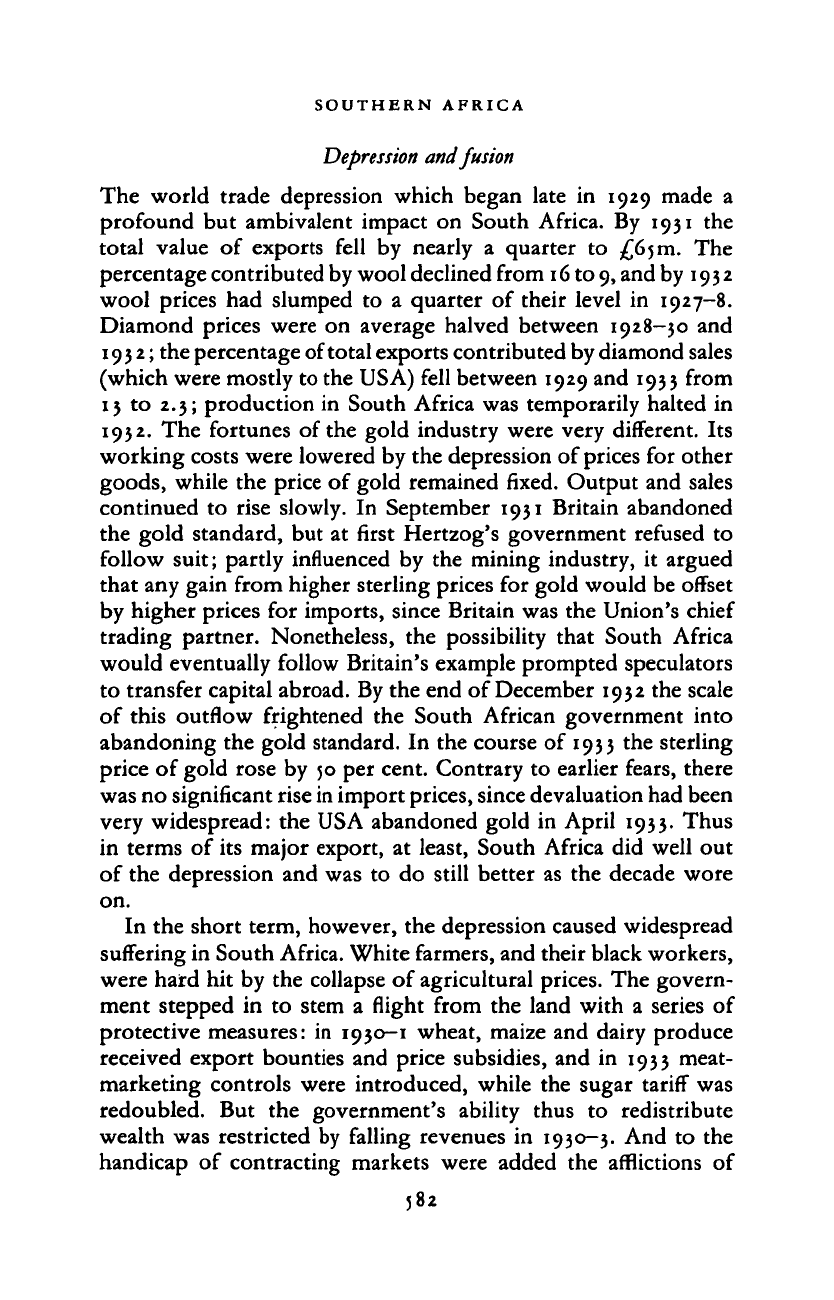
SOUTHERN AFRICA
Depression
and fusion
The world trade depression which began late
in
1929 made
a
profound but ambivalent impact on South Africa. By 1931
the
total value
of
exports fell
by
nearly
a
quarter
to
£6 5 m. The
percentage contributed by wool declined from
16
to
9,
and by 19
3 2
wool prices had slumped
to a
quarter
of
their level
in
1927-8.
Diamond prices were on average halved between 1928-30 and
1932;
the percentage of total exports contributed by diamond sales
(which were mostly to the USA) fell between 1929 and 1933 from
13
to
2.3; production in South Africa was temporarily halted in
1932.
The fortunes of the gold industry were very different.
Its
working costs were lowered by the depression of prices for other
goods, while the price of gold remained fixed. Output and sales
continued to rise slowly.
In
September 1931 Britain abandoned
the gold standard, but at first Hertzog's government refused
to
follow suit; partly influenced by the mining industry,
it
argued
that any gain from higher sterling prices for gold would be offset
by higher prices for imports, since Britain was the Union's chief
trading partner. Nonetheless, the possibility that South Africa
would eventually follow Britain's example prompted speculators
to transfer capital abroad. By the end of December 1932 the scale
of this outflow frightened the South African government into
abandoning the gold standard. In the course
of
1933 the sterling
price of gold rose by 50 per cent. Contrary to earlier fears, there
was no significant rise in import prices, since devaluation had been
very widespread: the USA abandoned gold in April 1933. Thus
in terms of its major export,
at
least, South Africa did well out
of the depression and was to do still better as the decade wore
on.
In the short term, however, the depression caused widespread
suffering in South Africa. White farmers, and their black workers,
were hard hit by the collapse of agricultural prices. The govern-
ment stepped
in to
stem
a
flight from the land with
a
series of
protective measures:
in
1930-1 wheat, maize and dairy produce
received export bounties and price subsidies, and in 1933 meat-
marketing controls were introduced, while the sugar tariff was
redoubled.
But the
government's ability thus
to
redistribute
wealth was restricted by falling revenues in 1930-3. And to the
handicap
of
contracting markets were added the afflictions
of
582
Cambridge Histories Online © Cambridge University Press, 2008
